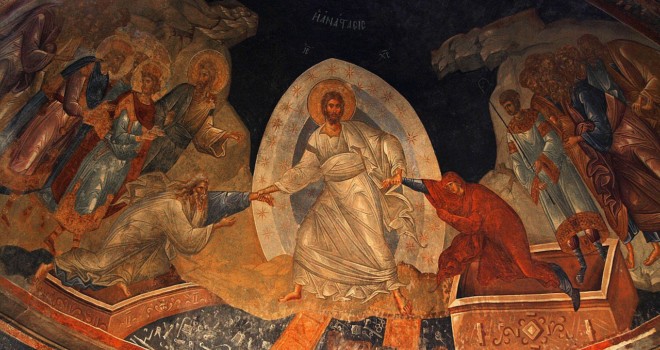He descended into hell… .
Few lines of the Apostles Creed are as overlooked as this one.
Seen alone, the truth expressed in this simple line is shocking: the Church teaches that Christ went to hell.
Why would the Church say such a thing? It seems utterly scandalous. But then so is the reality of the cross, not to mention the Incarnation itself.
But still: why do we affirm that Christ descended to hell?
The fundamental answer is that Christ did this to experience our fallen state to its fullest. That means that His death on the cross had to be a true death. And, in death, our bodies are separated from our souls. So while His body rested in the tomb, His human soul descended into hell—all the while still united to His divinity.
The descent to hell served two further purposes. First, during His three-day sojourn, Christ made proclaimed the gospel. As 1 Peter 3:19 says, He ‘went to preach to the spirits in prison.’ But Christ was also on a rescue mission: Church tradition holds that he rescued the holy fathers from limbo on the edge of hell, bringing them into heaven. This too is biblically grounded. (See for example Ephesians 4, quoted below.)
As with all aspects of the Passion, Christ’s descent to hell was not only a historical event. It is also something that affects our lives today—just as much as His last breath on the cross, or the piercing of His side.
As Catholics we believe that Christ did more than just pay the penalty for our sins. He gave us the ability to carry our own crosses to that in dying with Him we might also rise again. We are thus called to unite our suffering to His own on the cross. As Christ Himself said, “Come to me, all you who labor and are burdened, and I will give you rest” (Matthew 11:28).
Christ Himself also comes to us, consoling us by being radically present to us in our own suffering.
The doctrine of the descent to hell gives us the assurance that there is no darkness, no suffering, no horror, and no fear that Christ cannot touch. As the future Pope Benedict XVI put it in his Introduction to Christianity, “This article thus asserts that Christ strode through the gate of our final loneliness, that in his Passion he went down into the abyss of our abandonment. Where no voice can reach us any longer, there is He.”
Christ’s descent to hell shows us that Christ words reach us and touch us even in our moments of deepest despair. As Psalm 139 puts it, even if we tried to we could not escape His presence:
Behind and before you encircle me
and rest your hand upon me.
Such knowledge is too wonderful for me,
far too lofty for me to reach.
Where can I go from your spirit?
From your presence, where can I flee?
If I ascend to the heavens, you are there;
if I lie down in Sheol, there you are (verses 5-8).
But something wonderful happens during the descent. Traditional doctrine holds that the descent was a glorious event. Traditional icons and frescoes depicting it tend to show Christ not on the cross, but carrying it as a sort of trophy. He breaks down the gates of hell, tramples Satan, and lifts Adam and Eve out of their tombs. In one traditional image, Christ is surrounded by the white mandala. In a more recent painting a halo of light encircling Him shines into the darkness of hell.
This perspective is confirmed the account of Ephesians 4, which makes it clear that the ascent was predicated on a descent—almost defining the ascent in terms of the descent:
Therefore, it says:
“He ascended on high and took prisoners captive; he gave gifts to men.”
What does “he ascended” mean except that he also descended into the lower regions of the earth?
The one who descended is also the one who ascended far above all the heavens, that he might fill all things (verses 8-10).
In the Greek tradition, Christ’s descent to hell is known as the Anastasis, which means resurrection. This might seem like an oxymoron, since we typically think of the resurrection as happening on the third day. But the term speaks to a deep truth: Christ’s resurrection begins in hell.
This, then, is the ultimate consolation of the Church’s teaching on the descent to hell. The source of all our hope has its roots deep in the land of despair. Indeed, one traditional view of hell that it is the place we all who enter should abandon hope. This is because hell is defined as the absence of God’s presence—a sort of antithesis to what heaven will be.
And yet, God did go to hell. Thanks to Christ, there is no chasm too wide or despair too deep for God’s love to reach us. That is the enduring significance of His descent to hell.
✠
image: By Joseph Kranak (Flickr: Anastasis fresco-Kariye) [CC BY 2.0 ], via Wikimedia Commons










